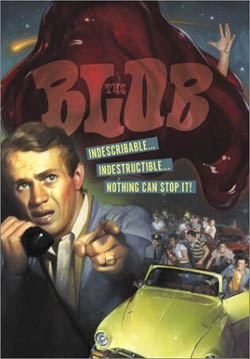 |
Consequences of Vatican II
The Parasite and the Lemmings
Lyle J. Arnold, Jr.
Let me remind my reader of an old story. In an obscure wooded area in California, in the mid 1950's, a gentle and withered old recluse came upon a mysterious, nefarious substance, something foreign to anything he had ever seen. Instead of exercising vigilance, and seeking help from the proper authority so that he might approach the thing with caution and prudence, he extended his hand to it. The organism attached itself to him, clung to him, and then, horribile dicta!, it was too late.

A billboard advertising The Blob in the '50s |
Disoriented, in pain and panic, he found his way to a nearby country road where two teenagers, Steve Andrews and his girlfriend Jane Martin took pity on him and drove him to a small town. By that time, the tormented man was hysterical, emitting groans, stripped naked and raw from his soul. Gazing in helpless bewilderment upon the odious leech, the examining doctor thought it to be some kind of "parasite” (1), observed that it was absorbing the flesh of the hermit! Before long, it had completely consumed both the old recluse and the unsuspecting doctor. Then it went on to menace everyone within its range. Those who made direct contact with the eponymous blob (a name most apt, surely) were devoured, and this served to fatten the virus and multiply its power.
A diabolical war had begun. When news of the blob began to spread in the town of the devoured physician and his patient, the regular authority was indecisive and divided on what action to take, and therefore impotent. Steve and Jane, however, took up the call and rallied a small hoplite army, much like the soldiers of the 1793 Vendée resistance. The blob was thus defeated.
Now, let me identify the characters of my metaphor taken from the movie The Blob. The recluse is the pre-conciliar Church, which increasingly isolated after the death of St. Pius X, withdrew more and more into the desert of obscurity. This was so much so that a vacuum existed in its citadel, leaving it vulnerable to the attack of Progressivism, the parasite-blob. The impotent "regular authority" of the Church, the ensemble of her Prelates, had become spiritually and intellectually soft, and thus lacking in vigilance.
Through a coterie of enemies of the Church at the Council, this Progressivism injected its venom into the Council as a spider injects poison into its victim through its fangs. A small resistance movement actuated in the Council, but the opposition was too well-prepared. The blob immediately began absorbing the flesh of the Church militant, becoming increasingly bloated with its victims, and ever more powerful. Steve and Jane are the faithful Catholic remnant who made the call to arms.
In today's Catholic world, the blob of Progressivism has become so utterly hypertrophied it can only be described as a chimera. Given the Vatican leadership (or rather the lack of it) since the Council, this is quite understandable. A recent disclosure of a text by Pope Benedict XVI, written when he was a Cardinal, shows this venom. He exposed his thinking on a subject that lies at the crux of psychology, the role of conscience:
"Conscience is the highest norm and ... one must follow it even against authority. When authority – in this case the Church's Magisterium – speaks on matters of morality, it supplies the material that helps the conscience form its own judgment, but ultimately it is only conscience that has the last word" (2).
Since we are created in the image and likeness of God, there is a compass in our minds that shows us what is good and bad. This is what Scholasticism called the upright conscience. However, this upright conscience is corrupted when a person adheres to errors or has a life of vices. The conscience becomes a broken compass that is no longer useful for his orientation. The broken conscience is always prone to be subjective, and cannot rely on its own powers.
Only when enlightened by the objective teaching of the Church can it hope to serve the will of God. If the conscience were "the last word," then Stalin, Hitler, and Pol Pot, who acted according to their own consciences, would be free from guilt.
This reason makes Ratzinger's law absurd. If Cardinal Ratzinger is right, every immoral act imaginable can be claimed to rest on the conscience, and the person committing it is therefore free of guilt.
How is it possible that this law could have been laid down by a Cardinal who now sits in the Chair of Peter?

The myth of lemmings' mass suicide |
Allow me another metaphor. The case of the lemming myth comes to mind in this dilemma. Every 7 to 10 years, these little rodent-type animals of the north begin a migration. This happens when their numbers have increased, leading to scarcity of food and overcrowding. When the tundra is free of its ice and snow, the large number of lemmings begin a feast on the vegetation, and literally eat themselves out of house and home. To find new feeding grounds, a small handful of lemmings begin to move, others follow. Soon almost the entire herd is racing towards the sea, in a compulsive hysteria, unmindful of why they are running. The migration takes on a life of its own as the lemmings continue to run, swimming lakes and rivers, crossing mountains, eating all vegetation in their path. Finally, they cascade over the cliff into the Artic Sea, swimming outward to destruction and death. Only a remnant remained behind, to begin their new society.
For 40 years Progressivism has caused a mass spiritual suicide. With the highest ranking official in the world saying that conscience is our final law, how many more Catholics will go over the cliff to spiritual destruction? May Our Lady of Grace pour her wondrous graces into the souls of her children, that some at least will join her remnant.
1. From the 1958 movie The Blob. In the story, the youth battle a monster blob of Jell-O that eats everything in its path.
2. Joseph Ratzinger, Values in a Time of Upheaval, Crossroads Pub/Ignatius Press, 2006. Cf. Editorial, New Oxford Review, November 2007, p. 16; also, Dale Vree "A Contradictory Definition of Relativism," posted on Tradition in Action, November 27, 2007.

Posted December 21, 2007

Related Topics of Interest
 Card. Ratzinger Against Scholasticism Card. Ratzinger Against Scholasticism
 Contradictory Definition of Relativism Contradictory Definition of Relativism
 The Current Vatican Moral Relativism The Current Vatican Moral Relativism
 Inadmissable Concessions, Once Again Inadmissable Concessions, Once Again
 Canonization of Relativism Canonization of Relativism



|
Vatican II | Hot Topics | Home | Books | CDs | Search | Contact Us | Donate

© 2002-
Tradition in Action, Inc. All Rights Reserved
|
 |
|